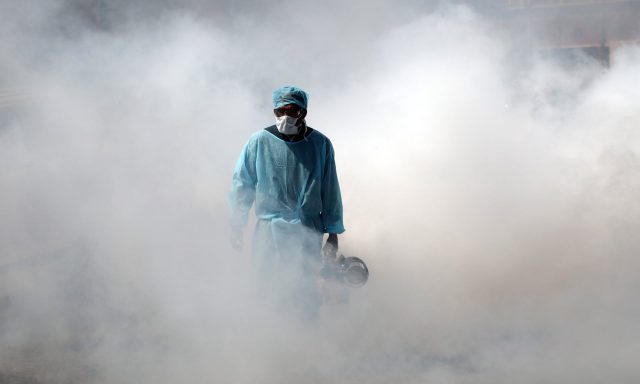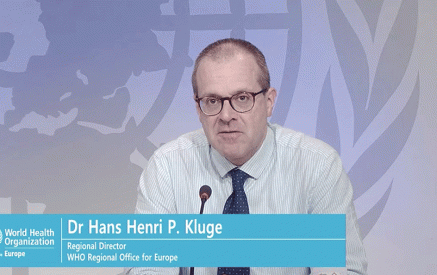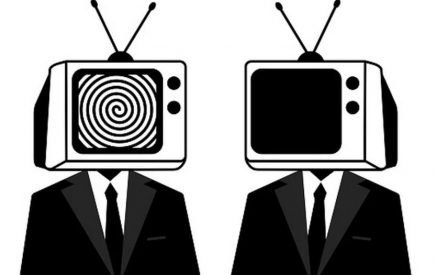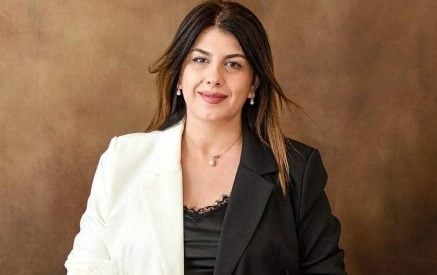Statement to the press by Dr Hans Kluge, WHO Regional Director for Europe
17 September 2020, Copenhagen, Denmark
Good morning,
We have a very serious situation unfolding before us. Weekly cases have now exceeded those reported when the pandemic first peaked in Europe in March [1].
Read also
Last week, the region’s weekly tally exceeded 300,000 cases. More than half of European countries have reported a greater than 10 per cent increase in cases in the past two weeks. Of those, seven countries have seen newly-reported cases increase more than two-fold in the same period.
In the spring and early summer we were able to see the impact of strict lockdown measures. Our efforts, our sacrifices, paid off. In June cases hit an all-time low.
The September case numbers, however, should serve as a wake-up call for all of us.
Although these numbers reflect more comprehensive testing, they also show alarming rates of transmission across the Region. While we did see an increase in cases among older age groups, 50-64 and 65-79 years, in the first week of September, the biggest proportion is still among 25-49 year-olds.
This pandemic has taken so much from us. In Europe 4,893,614 cases of COVID-19 have been recorded and 226,524 deaths. This tells only part of the story – the impact on our mental health, economies, livelihoods and society has been monumental.
The first of my key messages today is a call for Regional coherence, an amplified collective effort by all European Member States, for the sake of all European Member States.
The response to the crisis has been very effective whenever the actions were prompt and resolute; but the virus has been merciless whenever partisanship and disinformation prevailed. Where the pandemic goes from here is in our hands. We have fought it back before and we can fight it back again.
On Monday this week, at the WHO Regional Office for Europe’s Regional Committee meeting, the 53 Member States of the European Region unanimously adopted a new vision for health for the next 5 years. The European Programme of Work (EPW) focuses on meeting the needs and expectations of European citizens. With this endorsement countries articulated the importance of solidarity and trust between our countries. I do believe there is a willingness to live by this ethos as it will protect all our communities.
We will continue to advocate with government institutions for policy decisions that are prompted by an actual change in the situation and driven by epidemiological data. This capacity was well demonstrated as countries across the Region, gradually reopened schools. A great example of such coherence was the school conference we co-hosted with Minister Speranza of Italy in August, whichled to the consensus publication of “schooling during the Covid-19 pandemic” available on our website.
My second message, is that we need to use the knowledge and know-how that we now possess, to implement what works and not implement what doesn’t. We know we need hospital and Intensive Care Units capacity, personal protective equipment, but also much greater involvement of the primary and community care. We know we need to protect our health workers and other frontline workers who keep society running, and the elderly in long term care homes. And we know that basic pubic health measures work including scaling up of testing, handwashing, physical distancing, using masks when physical distancing is not possible and avoiding large gatherings.
And we need to be restless to update scientific knowledge as more evidence becomes available. Take for example quarantine, as a cornerstone of our fight against COVID-19.
The 14-day quarantine period is a conservative estimate of the infectious period, which – despite some remaining uncertainty – covers the period, before and after symptoms are present, when people may be infectious. Knowing the immense individual and societal impact even a slight reduction in the length of quarantine can have, and given the figures I have just mentioned, I encourage countries of the Region to make scientific due process with their experts and explore safe reduction options. The concept of quarantine must be protected, continuously adapted, clarified and well communicated without any ambiguity to people.
I am offering WHO Regional convening power to ensure that such discussions take place coherently and in a coordinated manner among Member States, and then communicated jointly to the people of Europe. Their adherence to quarantine is at the end what will define it and determine its purpose.
Despite continued high adherence and support to pandemic response strategies in populations across the Region, Member States are reporting and documenting COVID-related fatigue in their populations.
My third message, is that we need to understand people’s concerns, we need to empathize with the fatigue that is setting in. Fatigue is an expected and natural response to a long-standing public health crisis, which for everyone has had considerable implications for everyday life. Understanding who is experiencing fatigue and the barriers and drivers they experience in taking up protection behaviours allows to segment and tailor actions to those who need it the most, and based on the needs of specific population groups. This requires more successful and cost-effective policies, interventions and communication. It requires that we embrace disciplines outside of the bio-medical sphere, such as the social sciences and the humanities.
There are four key strategies WHO promotes here to counteract fatigue.
1. Collect and use evidence for targeted, tailored interventions. WHO Europe has been working with 27 countries to conduct behaviour insights surveys.
2. Find ways to engage individuals and communities at every local level. For example, in Denmark the Facebook page “True Story” involved influencers with video diaries of being young and on their own. It has reached 4 million people.
3. Focus on reducing harm, where and when possible, rather than closing down. Engage the youth in finding new and safe ways to be social.
4. Acknowledge hardship. Communicate hope and empathy.
For particular sub-groups or age groups, such as youth, for example, this means we make an effort to understand the barriers they face, we engage them, acknowledge the hardship and empathize, and make them part of the solution. We move from a ‘do not’ to a ‘do differently’ finding newer and safe ways to be social and avoid loneliness.
The WHO Regional Office for Europe is developing a framework to help authorities, both national and local, to plan and implement national and subnational strategies to counter fatigue and reignite public support for recommendations and COVID-19 preventive behaviours.
So, to repeat my three messages:
- Regional coherence and a spirit of collective support is crucial.
- The knowledge and know-how we possess has to be put to best use.
- Fatigue is natural and it needs to be understood and addressed, where it puts us at risk.
I’d like to close, by expressing our support to EU Commission President Ursula von der Leyen. Yesterday, Dr von der Leyen delivered her State of the Union to the European Parliament. Advocating to revitalise multilateralism, she called for a WHO that is fit for purpose and commended our joint efforts. We share her vision for a European Health Union. With Commissioner for Health and Food Safety Stella Kyriakides, we adopted a Joint Statement at the Regional Committee last Monday going into a historical partnership between the European Commission and the WHO Regional Office for Europe for the benefit of the Member States and people both our organizations serve.
Commission President Von Der Leyen referred to the ‘unshakeable belief in the hidden strength of the human spirit’, which I believe has been at the very heart of our response. We need to draw on that spirit again in order to take a collective leap forward towards a brighter future for our society.
Thank you.
For information and interview requests, please contact:
- Liuba Negru: [email protected]
- Sarah Tyler: [email protected]
- Catharina Reynen-De Kat: [email protected]
[1]
In the past week, more than 300,000 laboratory confirmed cases (305, 054 for week of Sept 7) have been reported from across the European region. This is now more cases than were reported in the peak week in late Spring (264,675 for week March 30)
WHO/Europe Press





























































